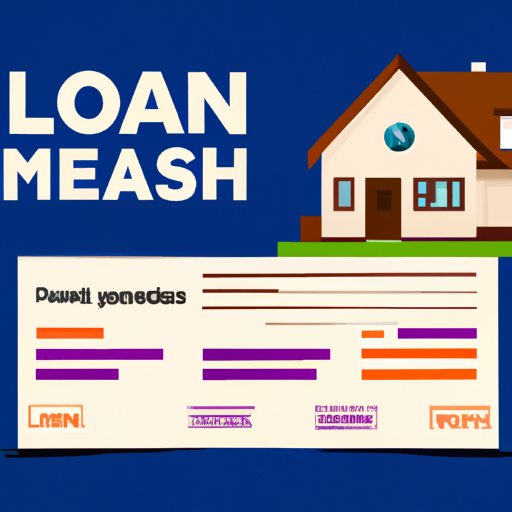Introduction
Purchasing a home is a major financial decision, and one of the most important aspects of this decision is determining how much of a loan you can take out. Knowing the size of the loan you can get will help you decide how much you need to save, what type of mortgage you should apply for, and ultimately, what kind of home you will be able to buy. With this in mind, many people are left wondering: “How big of a house loan can I get?”
This article will explore the process of calculating your maximum house loan amount, what to know before taking out a big loan, and how to secure the right loan for you. It will also cover different types of loans available and qualifications. By the end of the article, you will have a better understanding of how to determine how big of a loan you can get so that you can make an informed decision about buying a home.
Calculating Your Maximum House Loan: A Step-by-Step Guide
The process of calculating your maximum loan amount starts with understanding your income and expenses. You need to be aware of your monthly income, as well as any other sources of income such as investments or rental properties. Additionally, you need to be aware of your monthly expenses, such as rent, utilities, groceries, and any other recurring costs.
Once you have a good understanding of your income and expenses, you can then calculate your debt-to-income ratio. This is a simple calculation that compares your total monthly debts (including your proposed loan payment) to your total monthly income. If your debt-to-income ratio is too high, it may be difficult to qualify for a loan. Most lenders prefer a ratio of no more than 36%.
Once you have calculated your debt-to-income ratio, you can then use this information to figure out your maximum loan amount. This amount is based on a few factors, such as your income and credit score. Generally speaking, the higher your income and credit score, the larger the loan amount you can qualify for. Additionally, if you make a large down payment, you may also be able to increase your loan amount.
What to Know Before Taking Out a Big House Loan
Before taking out a large loan, there are a few things you should consider. First, you should think about the interest rate on the loan. The interest rate on your loan will determine how much you end up paying over the life of the loan, so it is important to shop around and find the best rate possible. Additionally, you should consider the closing costs associated with the loan. These costs can add up quickly, so it is important to factor them into your budget.
Finally, you need to consider long-term affordability. Even if you can afford the monthly payments now, you need to make sure that you will still be able to afford them in the future. This means considering potential changes in your income, the possibility of increased expenses, and the potential for rising interest rates.

How to Secure the Right House Loan Amount for You
Once you have an idea of how much you can borrow, you need to find a lender who can provide you with the loan. This means researching different lenders to find the one that offers the best terms and rates. It is also important to shop around for the best rate, as different lenders may offer different rates. Additionally, you should be prepared to negotiate the terms of the loan, as some lenders may be willing to work with you to give you a better deal.

Maximizing Your House Loan Eligibility
If you want to maximize your chances of getting the loan you need, there are a few steps you can take. First, you should try to increase your credit score. This will make you more attractive to lenders, and may allow you to qualify for a larger loan amount. Additionally, you should try to make a large down payment. This will reduce the amount you need to borrow, and can improve your chances of being approved.
Finally, you should try to pay off any existing debts. This will reduce your debt-to-income ratio and make you a more attractive borrower. Additionally, it will free up more money each month so that you can better afford your loan payments.
Understanding House Loan Qualifications
When applying for a loan, there are certain qualifications you must meet in order to be approved. Generally speaking, you need to provide proof of income, proof of employment, and a variety of other documents. Additionally, you may need to provide collateral, such as a vehicle or other property, in order to secure the loan.
You also need to meet certain credit requirements. Most lenders require a minimum credit score of 620, though some may require a higher score. Additionally, some lenders have specific credit score requirements for different types of loans. So, it is important to research what kind of credit score you need before applying.

Exploring Different Types of House Loans Available
When looking for a house loan, you have several options available to you. Conventional loans are the most common type of loan, and they are offered by most banks and mortgage lenders. FHA loans are government-backed loans that are designed to help low-income borrowers. VA loans are specifically designed to help veterans and their families purchase homes. Finally, USDA loans are designed to help rural homeowners purchase homes.
Conclusion
In conclusion, it is important to understand how to calculate your maximum house loan amount so that you can make an informed decision about buying a home. The process starts with understanding your income and expenses, calculating your debt-to-income ratio, and using this information to determine your maximum loan amount. Additionally, you should consider interest rates, closing costs, and long-term affordability before taking out a large loan. You can secure the right loan for you by researching different lenders, shopping around for the best rate, and negotiating terms. Finally, you can maximize your loan eligibility by increasing your credit score, making a large down payment, and paying off existing debts. By following these steps, you will be able to find the right loan for you.
(Note: Is this article not meeting your expectations? Do you have knowledge or insights to share? Unlock new opportunities and expand your reach by joining our authors team. Click Registration to join us and share your expertise with our readers.)
